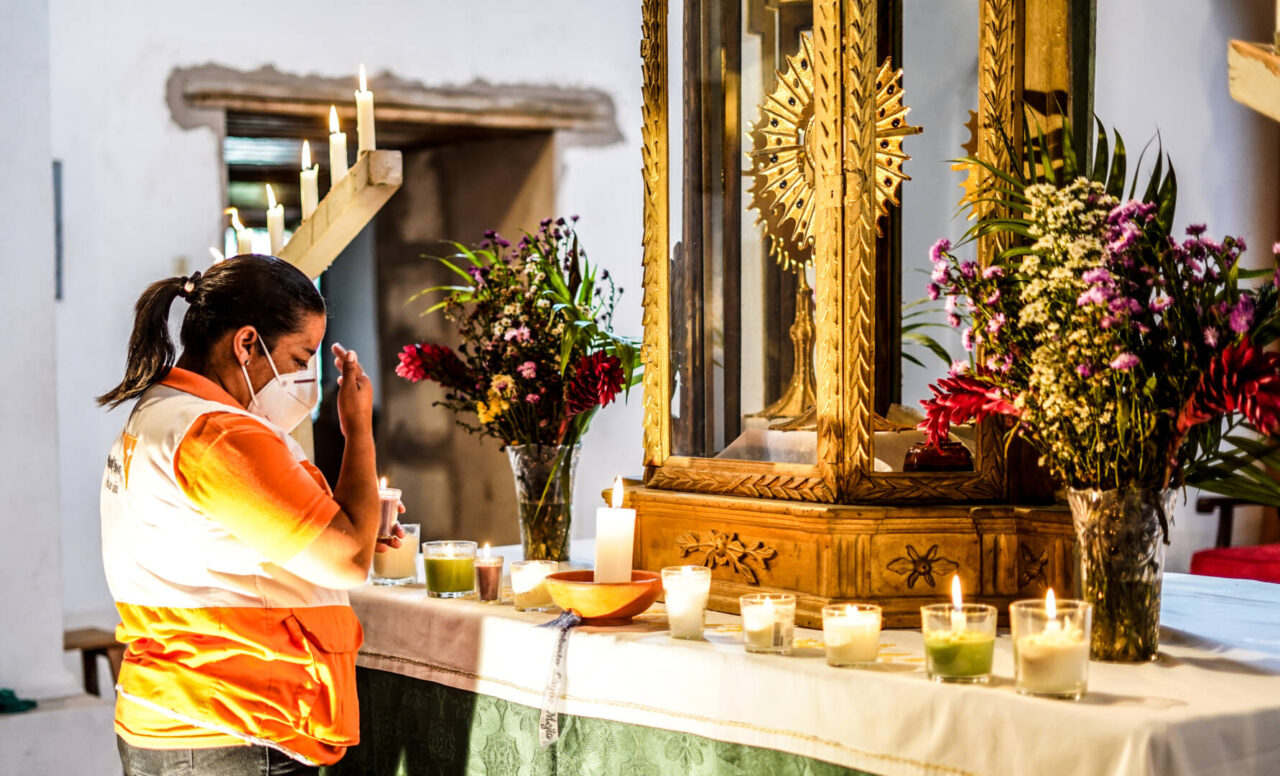Faith leaders must play key role in COVID-19 vaccine roll-out
Media Contact :
January 11, 2021
Senior Public Relations Manager
[email protected]
m 404-735-0871
Media Contact :
January 11, 2021
Senior Public Relations Manager
[email protected]
m 404-735-0871

SEATTLE (January 11, 2021) — A recent survey conducted by Christian humanitarian organization World Vision highlights the key role faith leaders and community health workers must play in a global campaign to roll-out a COVID-19 vaccine.
A year after the World Health Organization first reported an outbreak of a new coronavirus in China, new Barrier Analysis studies by World Vision are demonstrating just how important religious leaders’ endorsements of the COVID-19 vaccine will be to the next stage of efforts to contain and roll back the pandemic.
“The COVID-19 vaccine is the answer to many prayers, bringing hope for children and their families, whose lives have been gripped by the aftershocks of the pandemic,” said Margaret Schuler, World Vision’s senior vice president of international programs. “But the vaccine is only effective if people agree to take it. A recent survey confirms what our experience in the field tells us: faith leaders play a crucial role in vaccine rollout, in strengthening the health system, and in building local resilience. They are trusted partners who work closely with communities to involve them in the process, ensuring vaccines fully accepted.”
World Vision carried out studies in selected rural communities in Bangladesh and found that 100% of those surveyed who intend to get a vaccine agreed with the statement: “Most of my community leaders and religious leaders would want me to get a COVID-19 vaccine.” By contrast only 38% of those who intend to refuse a vaccine (‘non-acceptors’) agreed with that statement. Vaccine ‘acceptors’ were also 7.1 times more likely (than non-acceptors) to say they would be very likely to get a vaccine if a health worker recommended it to them.
The study also found that non-acceptors were almost 10 times more likely than acceptors to strongly agree with the statement: “Whether I get COVID-19 or not is purely a matter of God’s will or chance.” They were also 6.8 times more likely to say they did not trust the COVID-19 vaccines at all and 11 times more likely to say they did not know if getting vaccinated would protect them.
World Vision also carried out studies in Myanmar and found that the factors driving COVID-19 vaccine acceptance in communities there were similar in some aspects: ‘Acceptors’ were 3.7 times more likely to say that they would be very likely to get a vaccine if a health worker recommended it to them, and more likely to believe that most of their community and religious leaders will want them to get the vaccine (100% of acceptors vs. 80% of non-acceptors.)
These findings suggest that endorsement by religious leaders and community health workers is vital for community-level acceptance, the promotion of accurate health information, and to help to ensure high-level vaccination uptake. World Vision currently works with a network of more than 184,000 community health workers and has engaged with more than 210,000 faith leaders globally combatting the spread of the virus, especially at the grassroots level.
Studies conducted in India, Kenya, and Tanzania are currently analysing their results, which will be published at the end of the month. These findings will inform the focus of World Vision’s work in supporting vaccine roll-out and are being made available to the WHO, GAVI, and UNICEF.
World Vision has extensive experience partnering with children, communities and leaders to implement vaccine solutions around the world. The organization helped ensure more than 130,000 people in four countries were vaccinated, using a two-dose regimen, against Ebola in the West Africa and Democratic Republic of Congo outbreaks, and have been heavily involved in Polio eradication efforts for more than 20 years.
This expertise includes Barrier Analysis surveys, developed by World Vision‘s Tom Davis, to assess reasons for resistance to health programs.
World Vision is committed to supporting the fair and equitable global roll-out of WHO endorsed vaccines and is partnering with governments, faith leaders, and community health workers in combatting the spread of COVID-19.
“Vaccines give children and their families a way of out this crisis and builds their resilience,” Schuler explained. “Still, they must be rolled out globally so that vulnerable people everywhere are treated fairly and valued equally. Along with addressing vaccine acceptance, World Vision is partnering with many other actors to advocate for equitable, rapid and strategic vaccine distribution internationally.”
About World Vision:
World Vision is a Christian humanitarian organization conducting relief, development, and advocacy activities in its work with children, families, and their communities in nearly 100 countries to help them reach their full potential by tackling the causes of poverty and injustice. World Vision serves all people regardless of religion, race, ethnicity, or gender. For more information, please visit www.WorldVision.org/media-center/ or on Twitter @WorldVisionUSA.